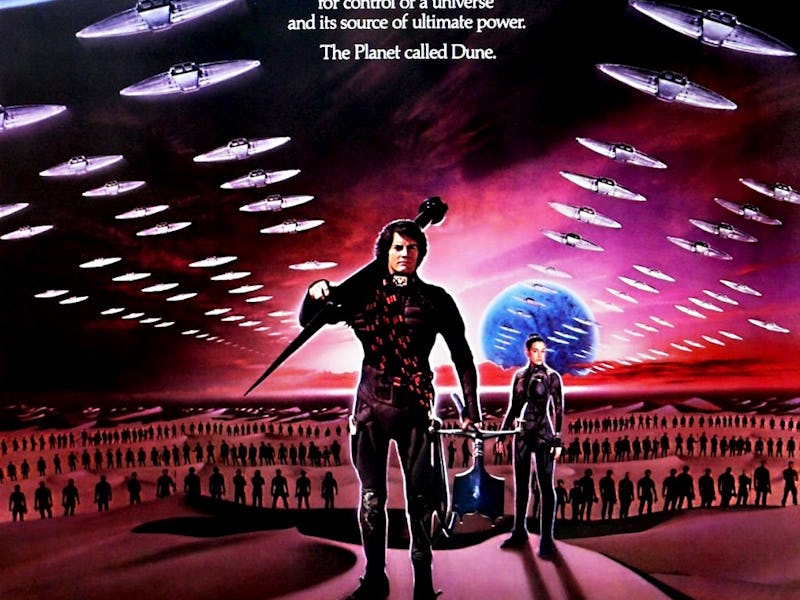What a New 'Dune' Universe Can Take From David Lynch's Failed Film
If done right, Legendary's hard sci-fi franchise could be the next 'Game of Thrones.'.

Earlier this month, Legendary Pictures announced that it had acquired the rights to author Frank Herbert’s influential novel Dune for both film and TV projects. The goal: finally turning the notoriously dense sci-fi story into a global franchise à la Star Wars.
Needless to say, Legendary won’t be making the first the first attempt at pulling off this difficult trick.
Herbert’s multi-book story focuses on illustrious future fantasy about a protagonist named Paul Atreides, whose noble family is betrayed by their sworn enemies after they accept control of a vast desert planet called Arrakis. The most ambitious attempt — and flop — to date was filmmaker David Lynch’s 1984 attempt at bringing the first book to the big-screen. The film, which starred Kyle McLaughlin was caught between two worlds: The studio’s desire to make an expensive A New Hope-esque franchise starter, and Lynch’s weirdo predilections. The film crumbled because there was no solid middle ground.
Even Lynch didn’t like the end result. He has all but disowned it in his filmography, and certain cuts of the film features the pseudonym Alan Smithee in place of Lynch’s own credit. But for all its faults, the film has the ingredients inherent in Herbert’s original story that have made fans perpetually excited for a more fully coherent adaptation.
A 2000 miniseries starring William Hurt came close to capturing the source material’s greatness, but still fell short. The news that Legendary is gearing up to put all their resources into kickstarting Dune again, especially in an era where once-unadaptable and dense material like Game of Thrones has become such a hit, offers hope once again. Here’s what Legendary needs to take away from Lynch’s failed movie.
The Scope of the Story
Trying to cram all of the eccentricities of Herbert’s elaborate thousand-page story into a two-hour movie is just kind of silly, but filmmakers in the 1980s couldn’t rely on TV for a prolonged story like this. The biggest problem with Lynch’s film is that it’s constantly rushing to the next scene and big development in such a weird context that it’s difficult for an audience to keep up. The flaw isn’t because of its hard sci-fi approach but because it takes the incredible heft of the story it’s trying to tell for granted.
Atreides is a boy who suddenly comes to realize he’s a god. He fulfills a prophecy on the planet Arrakis with the help of its mystical desert inhabitants called Fremen, but the editing down of the film never gives this huge revelation the room it needs to build. Paul gets to Arrakis, flees when the enemy clan the Harkonens murder his father in a hostile takeover, is almost immediately accepted into the normally un-inclusive Fremen, trains them how to fight a bit, and then easily returns to proclaim himself a god. It’s all too easy and doesn’t land, and the way to make that happen would be to stretch the story out into much-needed season-long swaths.
The Wide-Ranging Cast
The best thing Lynch’s film has going for it is that he populated it with great actors. Many of them, including MacLachlan, Dean Stockwell, Everett McGill, appeared in some of his other movies. But in the Dune movie they don’t really have anything to do other than to hit their story beats. The epic sci-fi narrative is there, but the characters don’t ever get to sell it.
Something like Game of Thrones, which is populated with a huge ensemble spread across its intimidating fantasy map, manages to give each character and storyline their due because they’re treated equally important. That’s something that a hugely populated property like Dune fundamentally needs to do. It would give a background character like the evil Feyd Rautha (played by Sting), who barely has anything to do in the film, more of an impact when he begins to challenge Paul in the climax. But it would also keep the broader character story of the Harkonen power struggle against the Atreides forces in check.
The World-Building
You know you’ve got a lot to absorb when a film begins with a direct voiceover about the complexities of the family relationships in the story you’re about to see, and then 10 minutes later it has to explain even more.
The world of Dune is big and intimidating, with strange concepts like female religious sects called the Bene Gesserit, an almost magical natural resource called Melange, a Force-like spiritual training called the Wyrding Way, and a eugenics-based prophecy that will bring about a perfect being called the Kwisatz Haderach. But these days, that doesn’t sound all that crazy; why couldn’t those concepts become as accepted as things like Khaleesi, wargs, maesters, and the Unsullied? It doesn’t need to be over-explained, but it can’t be confusing.
Game of Thrones offers a perfect proxy, not only because it’s also a complex fantasy tale equal to Dune’s hard sci-fi. It also pulled off the difficult task of selling a bunch of crazy stuff and unusual names to an audience, because the reality of the world the show created made it easy to accept. The movie simply throws a lot of the hard sci-fi concepts out there, but showing us why the Kwisatz Haderach or Arrakis is important instead of just saying they are is what an audience needs to make the world resonate.